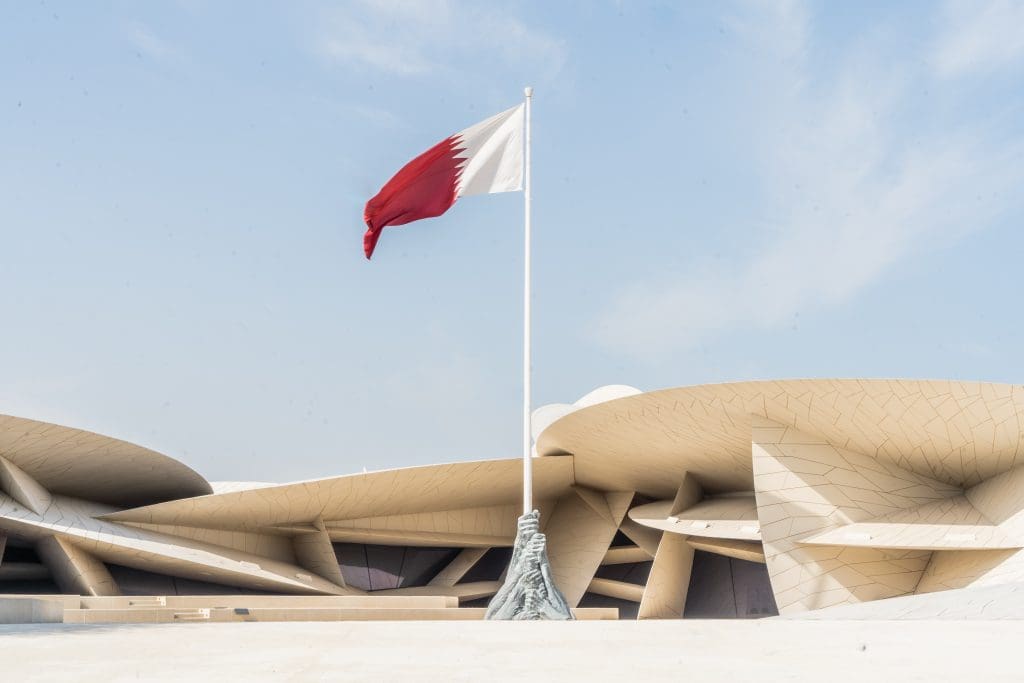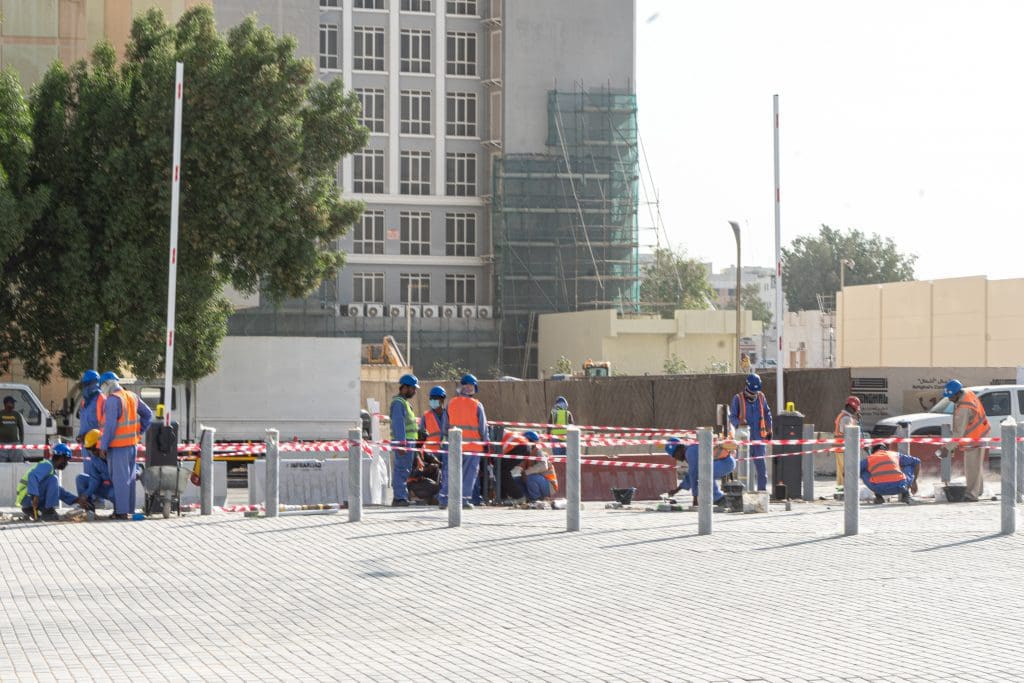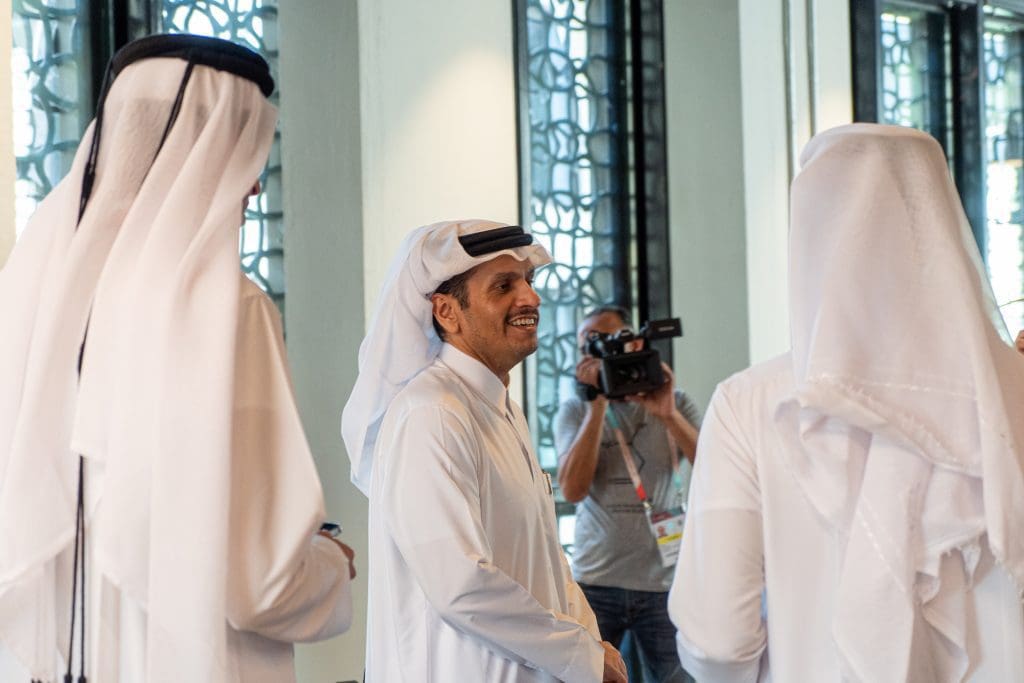
“The appearance of the capital, Doha, suggested the aftermath of an air raid as unoccupied and even occupied houses crumbled into decay. In the countryside, at its best a harsh and barren moonscape of a land, the desert advanced pitilessly against the few patches of cultivation,” Sir John Arthur Wilton, the first British political agent in Qatar wrote in 1949.
Such accounts of the small Arab nation’s grim past are now spectacularly showcased in the National Museum of Qatar, an architectural marvel in a shape of a desert rose.
Next week, Qatar will host the 22 edition of the FIFA World Cup. It marks the culmination of the country’s extraordinary campaign to first win the vote to host the tournament in 2010 and the controversial years of preparing for the biggest sporting event in the world.
Some estimates put total infrastructure spending over the past decade at more than $200 billion. The nation has undergone a remarkable transformation in preparation— a new airport, seaport, dozens of museums, and finest public transportation facilities among other things.
But Qatar’s efforts to impress the world have not been easy or well received. The oil-rich country’s treatment of migrant workers and its human rights record have been under the spotlight since it was awarded the hosting of football’s 2022 FIFA World Cup.
Human rights groups have also campaigned against Qatar’s strict laws against homosexuality. Even as the World Cup is days away from starting, talk of boycotts in Europe and Western countries is only getting louder.


Qatar “is too small of a country,” Sepp Blatter, former FIFA president, recently told Swiss newspaper Tages Anzeiger. “Football and the World Cup are too big for it.”
But Qatar is not silent or ignorant about it.
A new report by International Labour Organization, released weeks before the tournament says Qatar has made progress in its labour reforms but challenges in their implementation remain. Human rights groups have also acknowledged it.
Qatar’s Minister of Foreign Affairs Sheikh Mohammed bin Abdulrahman Al Thani said that the “attacks” were being made “by a very small number of people”.
In the interview, Al Thani said Qatar was a “very welcoming country” and that the “entire world is welcome in our country”, responding to questions about the concerns of the LGBTQ+ community.
In a speech last month, Qatar’s emir, Tamim bin Hamad al-Thani said his nation was the target of “unprecedented” outside attacks that “include fabrications and double standards that were so ferocious that it has unfortunately prompted many people to question the real reasons and motives behind the campaign.”


After the Allegations of corruption, vote-swapping, and links to trade deals at the highest levels of government have always been denied by organisers and remain unproven.
In Doha, fans and teams have arrived to celebrate one month of football. The country itself has become an exhibition with its rich heritage at the centre of attraction.
Powerful allies
Although small in size, Qatar made sure they are protected and remained relevant throughout its modern history to the present day. It maintains diplomatic relations with groups and countries that hate one another, allowing it to work as a mediator.
In 1916, an Anglo-Qatari treaty was signed and Qatar was placed under the British Trucial system of administration, becoming the ninth and last of the Trucial States. Doha was made the capital of the British Protectorate of Qatar.
It means Qatar was under the protection of Britain, especially from other Arab countries which had an eye for the peninsula rich with natural oil and gas under its soil and sea.
In 1970, Qatar’s ruler announced independence after a new Anglo-Qatari treaty of friendship and cooperation was signed, formally terminating the old treaties of protection. The friendship helped them build their infrastructure and oil industry.
Qatar also moved close to the United States, the most powerful country of the time. Qatar hosts the largest US military base in the region. It played a crucial role in the Kuwait war.
Beyond security arrangements, Qatar plays many roles in International politics and makes strategic diplomatic moves. Qatar has used its wealth to play an outsize role in regional politics.
Qatar has been enthusiastic about hosting global events, making sure they leave a mark.
Asian Cup, 2006 Asian Games, 2019 World Athletic Championships, 2015 World Handball Championships, and 2022 FIFA Arab Cup are among the sporting events Qatar has hosted in the recent past.
Qatar hosts top officials from Hamas, the Palestinian militant group, and the Taliban, a militia group that now governs Afghanistan. Qatar is a top negotiator among African countries as well.
Al Jazeera, the Arab satellite network owned by the government, has become one of the most influential media groups in the world.
Experiencing Al Jazeera is one of the exhibitions open during the FIFA WC, showcasing its role in shifting the narratives about power and politics in the region and other parts of the world.
Qatar is widely recommended as a supporter of the Arab Spring uprisings of 2011 and a stringent ally of Palestine. Qatar has close relations with Muslim Brotherhood, an Egypt-based Islamist movement.
In 2017, Saudi Arabia, the United Arab Emirates, Bahrain and Egypt cut diplomatic and trade ties with Doha, and imposed a sea, land and air blockade on Qatar, claiming it supported “terrorism” and was too close to Iran.
But the three-and-a-half-year embargo, which ended with Qatar not agreeing to any of the initial demands put forward by the neighbours, actually made Qatar even more powerful. Qatari Foreign Minister Mohammed bin Abdulrahman insisted that the end of the blockade will not change Qatar’s relationship with Iran.
During the blockage, Qatar grew closer to Turkey, another giant in world politics now.
But Qatar’s trump card is still its natural gas. It would make Qatar one of the world’s richest countries per capita. It also makes world leaders come to Qatar for help.
In January, as fears rose of a Russian invasion, US President Joe Biden declared Qatar a “major non-NATO ally” and hosted Sheikh Tamim at the White House, the first Gulf head of state given such a welcome.
After the war began, then British Prime Minister Boris Johnson called Sheikh Tamim to discuss “ensuring sustainable gas supplies”. Germany and other European countries have followed while Qatar enjoys a good relationship with Russia.
Qatar also played a major role during the US withdrawal from Afghanistan last year.
Safar, a temporary exhibition outside Qatar’s Museum of Islamic Arts captures Qatar’s critical role in Afghan evacuation. This will be a reminder for visitors coming to the tournament.
But its enormous role in the economy and politics has not rescued it from the negative coverage by western media. Many critics in Qatar see the slew of articles against the Arab nation as a “prejudice”.
The cultural values of the Islamic country is also under the strict scrutiny of International media and human rights group.
“FIFA Uncovered” but Qatar remains resilient
Since Qatar won the hosting rights for the World Cup, there was been mounting allegations about how the country with with no history in the World Cup won it.
Although Qatar was cleared of corruption by FIFA several years ago, the label of “buying the World Cup” remains.
Weeks before the kickoff, Netflix have released a documentary series called “FIFA Uncovered” narrating the corruption and politics of the football governing body. The four-episode Netflix series shows how FIFA muddled with Hitler’s Germany among other authoritarian governments to sportswash their legacy.
But unlike other monarchs in the world, Qatar’s emir has a wider acceptance among the people in the country, inlcuding mirgants.
Tamim is considered a forward thinking leader, displaying his commitments for people of Palestine while many other Arab leaders cave in.
The environmental impact of the tournament is another issue highlighted by media and climate groups.
Although Qatar claims this will be the first ‘carbon neutral’ World Cup, experts are now suggesting emissions could be three times the official estimate.
Defending its claim, Qatar says they will publish a post-tournament sustainability report, in alignment with the Global Reporting Initiative’s Sustainability Reporting Standards and following guidance from the United Nations’ Guiding Principles on Business and Human Rights Reporting Framework.
The recent stampede in South Korea during Halloween and a football stampede in Indonesia have triggered concerns about Qatar’s ability to host such a big event where they expect over 1.5 million people will visit.
A few trial events and the FIFA Arab Cup this year have shown the flaws made by the organisers. Although Qatar has hired the best agencies and developed adequate infrastructure, the strain the tournament will put on the country is unpredictable.
Numerous events and dozens of fan zones are getting ready in the country with less than a week to begin the tournament. The World Cup in Qatar will not just be about football, its critics and its supporters know that by now.
On November 20, the first World Cup to be held in the Arab world will kick off with the host nation playing Ecuador.



